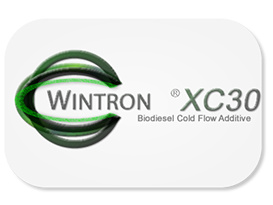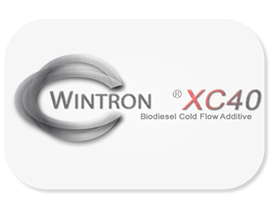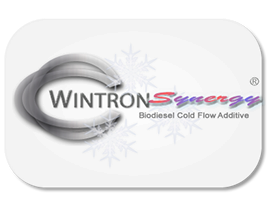
Wintron® Additives:
The most effective cold flow additives available for biodiesel
Pour point depressants formulated specifically for biodiesel
Markedly improves cold flow properties of biodiesel
General Information:
Wintron® additives are mixed with finished biodiesel. The biodiesel should be warm, and must be at least 5°C above the cloud point of the fuel i.e. it should appear clear
Treat rate varies, and is largely dependent on the feedstock used to produce the biodiesel. Typically treat rate is 0.1% - 2% by volume (i.e. 0.5% would be equivalent to 5 litres of Wintron® additive made up to 1000 litres with biodiesel)
Users must determine the required treat rate for their biodiesel
Best results are seen with biodiesel produced from unsaturated oils such as Rapeseed oil, Canola oil, Sunflower oil, Soy oil etc. Results with used cooking oil are generally good. Wintron additives are least effective for biodiesel produced from highly saturated feedstocks such as Tallow and Palm oil
Mechanism of Action:
The Wintron® range of additives are viscosity modifying componds. These compounds achieve their effect by reducing the tendency of viscosity to increase as the fuel is cooled which alters cold temperature crystallisation. The freeze point (FP), pour point (PP) and cold filter plugging point (CFPP) are reduced
Wintron® XC30
Original broad spectrum formulation. Low cost biodiesel pour point depressant (PPD) Effective for biodiesel produced from a wide range of feedstocks
Download the information sheet here
Wintron® XC40
Formulated to be maximally effective for biodiesel produced from predominantly Rapeseed or Soy oil feedstocks - the two most commonly encountered vegetable oils in Europe and North America
Download the information sheet here
Arctic Biodiesel:
When biodiesel is cooled below a certain point, some of the molecules aggregate and form crystals. The fuel starts to appear cloudy once the crystals become larger than one quarter of the wavelengths of visible light - this is the cloud point (CP) of the fuel. As the fuel is cooled further these crystals become larger.
Wintron® additives affect cold temperature crystallisation and reduce the temperature at which these crystals become large enough to block the pores of a fuel filter (CFPP - cold filter plugging point)
Cold Filtration:
The CFPP and CP can be further lowered by cold filtration of the fuel. Longer chain saturated biodiesel molecules tend to crystallise first. Although these molecules generally have higher cetane values, the overall cetane value of cold filtered fuel will generally fall well within accepted standards.
To make ultra cold weather biodiesel it is best to produce the biodiesel from an oil that already has good cold flow characteristics such as Rapeseed oil. For cold filtering:
Mix warm biodiesel with Wintron® additive(s) that maximally reduce pour point of biodiesel
Allow to cool to below the cloud point - the fuel must still be able to flow
Filter the biodiesel to 1 micron
Wintron Synergy® can be used as a stand alone CFPP depressant for biodiesels produced from Rapeseed oil, Canola oil and used cooking oils. It is more effective than other additives at improving the cold flow properties of biodiesel produced from saturated feedstocks such as tallow and palm oil. Results seen with biodiesel produced from used cooking oils are generally excellent
Wintron Synergy® has been shown to work synergistically as a pour point depressant with Wintron® X series additives for some types of biodiesel. With additional cold filtration arctic grades of biodesel can be produced
Download the information sheet here
Cold filtration will reduce the cloud point of biodiesel and reduce the CFPP and PP of biodiesel to lower temperatures that can be achieved using additives alone
CFPP - cold filter plugging point: lowest temperature at which a sample can pass through a filter. Conditions specified by EN116, ASTM D 6371 & IP 309 – the lowest temperature at which a 20ml sample passes through a 45μm wire mesh under 0.0194atm vacuum within 60s
The information provided above is given in good faith but without warranty, and this also applies where proprietary rights of third parties are involved. Any advice provided does not release you from the obligation to check its validity and to test the products as to their suitability for the intended processes and uses. The application, use and processing of this product and the products manufactured by you are beyond our control and, therefore, entirely your own responsibility






